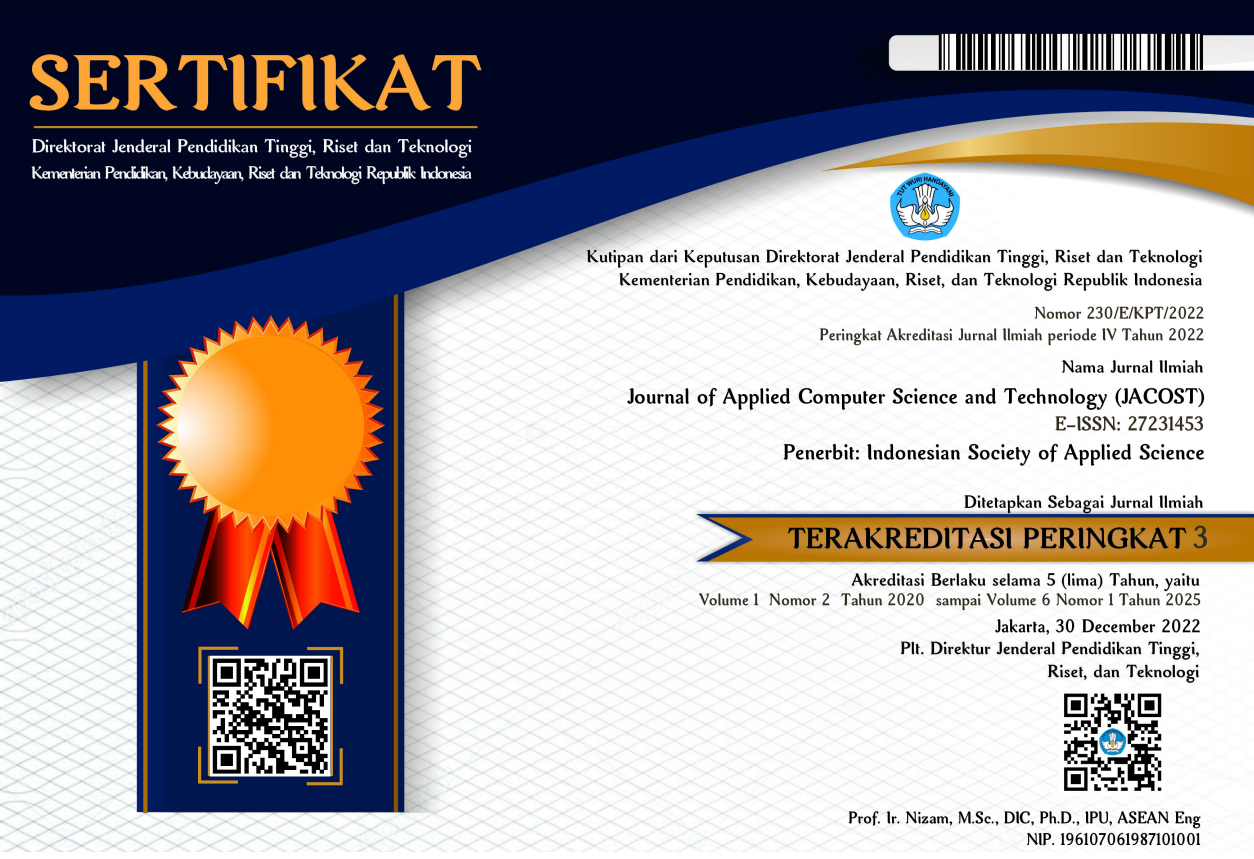Audit Keamanan Sistem Informasi Manajemen Rumah Sakit Dengan Framework COBIT 2019 Pada RSUD Palembang BARI
DOI:
https://doi.org/10.52158/jacost.v4i1.505Keywords:
Security Audit, Information System, Hospital Management Information System, Information System Security, COBIT 2019, RSUD Palembang BARIAbstract
This study examines the implementation of information system at RSUD Palembang BARI with the aim of enhancing information system security. In this context, a security audit is conducted using the COBIT 2019 framework. The COBIT 2019 domains and processes utilizing include EDM03, APO12, APO13, APO14, and DSS05. The research involves the identification and evaluation of information security risks, determination of necessary security controls, and ensuring compliance with the information security standards established by COBIT 2019. The findings indicate that the level of information system security at RSUD Palembang BARI is at level 3 (Defined), with a gap analysis difference of 1 level below the expected target. Based on the above results, efforts to improve and enhance the information system security at RSUD Palembang BARI are still needed. The use of information system security techniques such as vulnerability scanning, penetration testing, WAF, IDS and IPS, and data encryption, as well as improving security in terms of server physical aspects such as installing CCTV and restricting user access with access cards or fingerprints, can be implemented to ensure compliance with relevant information security standards. Consideration for obtaining security certifications, like ISO 27001, should also be taken. Additionally, the quality of human resources in terms of policy-making and the ability of employees to address threats and attacks on information system security should be improved through training and strengthening coordination among employees.
Downloads
References
World Health Organization. (2018). Hospitals. https://www.who.int/health-topics/hospitals#tab=tab_1.
Koumaditis, G. G., & Themistocleous, M. (2019). The Role of Information Technology in Modern Hospital Operations: A Case Study. Health Informatics Journal, 25(1), 71-81.
Abdekhoda, M., Ahmadi, M., & Dehnad, A. (2014). Hospital information systems user needs analysis: A vendor‐agnostic approach. Health Information Management Journal, 43(2), 20-27.
Pribadi, M. R. (2015). Penerapan tata kelola teknologi informasi dengan menggunakan COBIT Framework 4.1 (studi kasus pada RSUD Bari Palembang). Jurnal Eksplora Informatika, 4(2), 115-124.
Wibowo, A. P., & Anwar, M. Z. (2021). Audit Keamanan Sistem Informasi Rumah Sakit: Studi Kasus di Rumah Sakit Swasta di Surabaya. Jurnal Sistem Informasi, 16(1), 1-10.
ISACA. (2019). COBIT 2019 Framework: Introduction and Methodology.
Afshari M, Ahmadi M, B. D. (2014). A study of Hospital Information System in Iran: Applying the Consolidated Framework for Implementation Research. Journal of Hospital Administration, 3(2), 1-7.
Kumar, S., & Aldosari, B. (2017). Hospital information systems in Saudi Arabia: A qualitative analysis. International Journal of Health Policy and Management, 6(7), 403-408.
Chang, V., Ramachandran, M., & Li, X. (2012). Towards a framework for managing the security of cloud computing. Journal of Organizational and End User Computing, 24(4), 1-20.
Alhassan, M. M., & Adjei-Quaye, A. (2017). Information security in an organization. International Journal of Computer (IJC), 24(1), 100-116.
Riyanarto, S. (2009). Audit Sistem dan Teknologi Informasi.
Lainhart, J. W., Conboy, M., & Saull, R. COBIT 2019 Framework Introduction and methodology, Schaumburg: ISACA, 2019.
Sari, R. P. (2021). Audit Keamanan Sistem Informasi Rumah Sakit Menggunakan COBIT 2019. Jurnal Sistem Informasi, 13(1), 51-58.
Yulianti, E. (2020). Penggunaan COBIT 2019 untuk Audit Keamanan Sistem Informasi Rumah Sakit. Jurnal Ilmiah Teknologi Informasi Asia, 14(2), 47-55.
Wulandari, R. (2020). Evaluasi Keamanan Sistem Informasi Rumah Sakit Menggunakan COBIT 2019. Jurnal Sistem Informasi, 12(2), 68-75.
Downloads
Published
Issue
Section
License
Pernyataan Hak Cipta dan Lisensi
Dengan mengirimkan manuskrip ke Journal of Applied Computer Science and Technology (JACOST), penulis setuju dengan kebijakan ini. Tidak diperlukan persetujuan dokumen khusus.
- Hak cipta pada setiap artikel adalah milik penulis.
- Penulis mempertahankan semua hak mereka atas karya yang diterbitkan, tak terbatas pada hak-hak yang diatur dalam laman ini.
- Penulis mengakui bahwa Journal of Applied Computer Science and Technology (JACOST) sebagai yang pertama kali mempublikasikan dengan lisensi Creative Commons Atribusi 4.0 Internasional (CC BY-SA).
- Penulis dapat memasukan tulisan secara terpisah, mengatur distribusi non-ekskulif dari naskah yang telah terbit di jurnal ini kedalam versi yang lain (misal: dikirim ke respository institusi penulis, publikasi kedalam buku, dll), dengan mengakui bahwa naskah telah terbit pertama kali pada Journal of Applied Computer Science and Technology (JACOST);
- Penulis menjamin bahwa artikel asli, ditulis oleh penulis yang disebutkan, belum pernah dipublikasikan sebelumnya, tidak mengandung pernyataan yang melanggar hukum, tidak melanggar hak orang lain, tunduk pada hak cipta yang secara eksklusif dipegang oleh penulis.
- Jika artikel dipersiapkan bersama oleh lebih dari satu penulis, setiap penulis yang mengirimkan naskah menjamin bahwa dia telah diberi wewenang oleh semua penulis bersama untuk menyetujui hak cipta dan pemberitahuan lisensi (perjanjian) atas nama mereka, dan setuju untuk memberi tahu rekan penulis persyaratan kebijakan ini. Journal of Applied Computer Science and Technology (JACOST) tidak akan dimintai pertanggungjawaban atas apa pun yang mungkin timbul karena perselisihan internal penulis.
Lisensi :
Journal of Applied Computer Science and Technology (JACOST) diterbitkan berdasarkan ketentuan Lisensi Creative Commons Atribusi 4.0 Internasional (CC BY-SA). Lisensi ini mengizinkan setiap orang untuk :.
- Berbagi — menyalin dan menyebarluaskan kembali materi ini dalam bentuk atau format apapun;
- Adaptasi — menggubah, mengubah, dan membuat turunan dari materi ini untuk kepentingan apapun.
Lisensi :
-
Atribusi — Anda harus mencantumkan nama yang sesuai, mencantumkan tautan terhadap lisensi, dan menyatakan bahwa telah ada perubahan yang dilakukan. Anda dapat melakukan hal ini dengan cara yang sesuai, namun tidak mengisyaratkan bahwa pemberi lisensi mendukung Anda atau penggunaan Anda.
-
BerbagiSerupa — Apabila Anda menggubah, mengubah, atau membuat turunan dari materi ini, Anda harus menyebarluaskan kontribusi Anda di bawah lisensi yang sama dengan materi asli.















